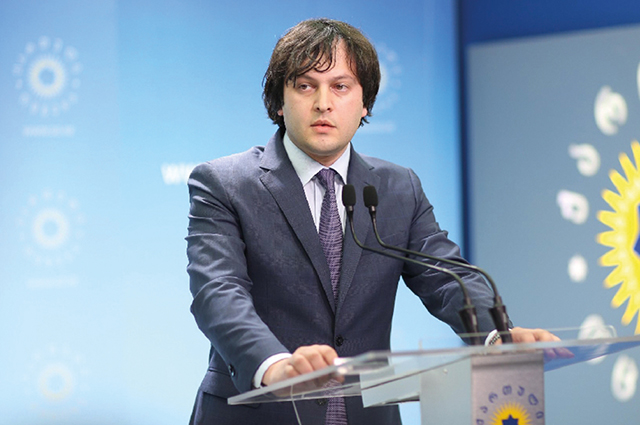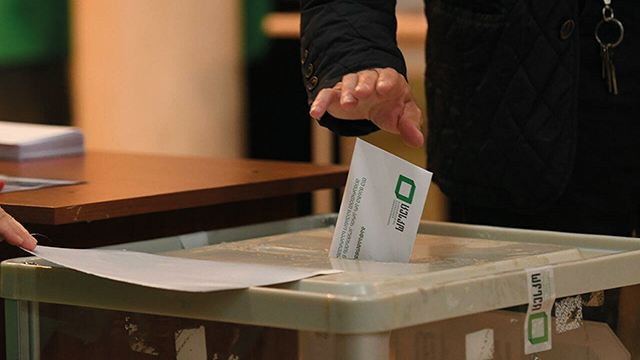On October 30, the second round of local self-government elections was held in Georgia in five self-governing cities, 15 municipalities, and 24 constituencies. Citizens had to elect 20 mayors and 42 majoritarian members of city councils.
As a result, the candidates of the Georgian Dream ruling party won in 14 out of 15 municipalities- in Tsalenjikha, Samegrelo, the candidate of the National Movement, Giorgi Kharchilava, defeated the candidate of the ruling team. This is the only self-governing community in the country where an opposition candidate won. Kharchilava got 51.107% of the vote, and Georgian Dream candidate Goga Gulordava, got 48.893%.
The united opposition said it did not recognize the results of the second round of elections, claiming the GD falsified the results, and called on their supporters to gather on 31 October in front of the Parliament building, where the opposition leaders presented their plan to hold a rally in Tbilisi on November 6.
According to Tbilisi mayoral candidate Nika Melia, in parallel with the rallies, they will appeal all election violations in the districts and then in the courts in order to go through full legal procedures. As Melia says, the aim is to show the country’s Western partners that holding rallies is not the will and aim of the opposition, but are necessary due to the current situation.
EU Ambassador Carl Hartzell, in coordination with EU Heads of Mission, released a statement saying:
“Following the first round, we stated that the reported malpractices must not become a norm in Georgia. We deplore that these elections have been a missed opportunity in this respect. Despite a clear assessment by the international observers, meaningful steps were not taken to address key shortcomings. On the contrary, further shortcomings have emerged, especially in terms of misuse of administrative resources and violent rhetoric by Georgia’s political leaders, further fueling an already deep political polarization. Suggestions made before these elections that the central government would not cooperate with local councils, should they swing towards another majority, are of concern as they seek to restrict the electorate’s choice and to limit pluralism.
“We call on all parties to stay engaged in the electoral process. Public trust in its integrity requires an inclusive, credible, and transparent recounting process and fair adjudication of complaints and appeals. In this regard, the Central Election Commission and the courts have a key responsibility in the days ahead,” Hartzell wrote.

Former president of Georgia, Mikheil Saakashvili, assessed the local self-government elections and stated:
“I am very angry and insulted, as all self-respecting Georgians should be. We had the elections stolen from us in every big city. We won this election and the group of bandits who usurped the Georgian government snatched this victory from us. They robbed us and deprived us of our most basic right to be the masters of our own country.”
Several opposition MPs in the week following the election renounced their parliamentary mandates in protest at the results. Lelo for Georgia party leader Mamuka Khazaradze was the first to leave parliament following the announcement of election results. Saakashvili assessed his move as “very impressive” and called on other opposition MPs to follow his example.
“My advice would be for the patriots of this nation and my comrades to do as Mr. Khazaradze did and to leave the parliament and leave the ‘Dream’ alone with itself,” read his message from Rustavi prison.
Other MPs who refused their mandates are UNM members Levan Varshalomidze, Ani Tsitlidze, and Nona Mamulashvili, Tako Charkviani, and Girchi-More Freedom leader Zura Japaridze. Other opposition MPs are expected to follow their example. MP Elene Khoshtaria went on a hunger strike in parliament Thursday, saying “I will continue my hunger strike until Mikheil Saakashvili is taken to a civil clinic. I choose a peaceful protest. Other members of the opposition have different forms.” Earlier in July, UNM Chairman Nika Melia renounced his mandate as he prepared for his mayoral candidacy.
Chairman of the Georgian Dream Irakli Kobakhidze states the ruling party convincingly won the local elections. “The most problematic aspect of this election, which all international observers noted, was the very high degree of polarization and the highly polarized media environment. It is our duty to change this situation qualitatively before the next elections. I believe this was the last polarized election in Georgia, and the next, 2024 parliamentary elections, will be held in a much healthier environment, amid a healthy political debate around election programs,” Kobakhidze said.
The US Embassy in Georgia released a statement on the second round of elections, noting that they share the Office for Democratic Institutions and Human Rights’ (ODIHR) assessment that the elections were generally calm and well-administered.

“We share ODIHR’s assessment that the elections were generally calm and well-administered, but allegations of intimidation and pressure on voters persisted, and continued polarization, coupled with the escalation of negative rhetoric, adversely affected the process. Sharp imbalances of resources and the undue advantage of incumbency further tilted the playing field. ODIHR also noted concerns with the persistent practice of representatives of observer organizations acting as party supporters, at times interfering with the process, and groups of individuals potentially influencing voters outside some polling stations. While ODIHR found that the CEC organized the second round in a professional and transparent manner, concerns over the impartiality of the lower-level election commissions persisted. US Embassy election observation teams witnessed similar interference and bias at several precincts.
“As these elections have shown, democracy is a work in progress. It requires dedication to the highest international standards and vigilance to ensure citizens’ rights and freedoms are protected. Some of the reforms enacted by Georgia’s political leaders through an inclusive, multiparty process earlier this year, such as automatic recounts and electronic vote counting, largely succeeded in increasing the transparency of the voting process,” reads the US Embassy statement.
The winner of the Tbilisi election for mayor, Kakha Kaladze, thanked all the people who trusted and voted for him.
“The main principle for me is that I am a mayor for absolutely everyone. I have stated several times that for me Tbilisi is not divided into my own and other people’s. This approach has not existed since 2017 and so I plan to continue my work this way. I will be a mayor for everyone and I am ready to use the enthusiasm, energy, knowledge, and experience of each person to make Tbilisi the greenest, most comfortable, healthy, and orderly city. To achieve these goals, the involvement and activity of every Tbilisian is needed,” Kaladze said.
By Ketevan Skhirtladze














